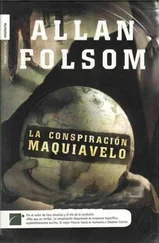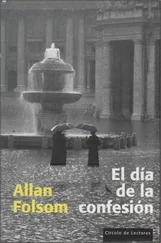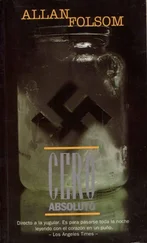"The Secret Service is still working with the hard drives, but already some information has been salvaged. Take a look."
Marten looked at the computer screen. What he saw was a series of still photographs taken in a room in one of Montserrat's tall buildings that overlooked the large plaza in front of the basilica. Apparently taken by Foxx with a remote camera, they showed a small office-sized room, a telescope, and a video recorder. Next came photos taken with a telescopic lens, as if through the telescope itself, and showing a number of close-ups of people in the plaza.
"It was how he selected his 'patients,'" the president said, "a never-ending supply. It was the 'general populace' he was looking for. Photographed handwritten notes suggest he pointed out those he'd selected to the monks, who took it from there. Not right away, but following the victims back to wherever they'd come from and later kidnapping them."
"The bastard thought everything through," Marten said angrily, and looked at them both. "Nothing on his plan for the Middle East or notes on his experiments?"
"No, at least not yet."
"What about Beck and Luciana?"
"Not a trace. They either got away or were trapped when the church went up. They are still on the list of those to be apprehended."
"So that's it? Until more of what the hard drives hold are uncovered or what the ongoing investigations might reveal."
"Sort of," Hap said quietly and looked to the president.
"A simple listing in a separate journal that was kept by my friend and adviser Jake Lowe," the president said, then he hesitated and Marten could see a wave of emotion come over him.
"What is it?"
"You knew my wife was Jewish."
"Yes."
"You knew too that she died of brain cancer in the weeks just before the presidential election."
"Yes."
"They wanted the Jewish vote. They didn't want a Jew in the White House. They thought if she died I would gain a huge boost in the polls not just in sympathy from the Jews but from the general public."
Again Marten felt the hair rise up on his neck. "Foxx killed her with something that mimicked brain cancer."
"Yes," the president nodded and then trembled and tried to blink the tears from his eyes. "It seems," he said with great difficulty, "we both lost someone we loved immeasurably."
Marten went to the president and embraced him, and for the longest moment the two men stood there in each other's arms. Each knowing to his soul what the other was feeling.
"Mr. President, we have to go," Hap said finally.
"I know," he said, "I know."
The men looked at each other and the president smiled. "When this all calms down you'll come to my ranch in California and we'll have that steak and beer. Everyone. You, Hap, Demi, Miguel, and the boys."
Marten grinned, "Hap told you."
Now it was Hap's turn. "I started to but he told me first."
Marten put out his hand. "Good luck, Mr. President."
The president took it, then hugged him once more and stepped back. "Good luck to you too, Cousin, and God bless."
Then he turned and was gone. Hap took Marten's hand and nodded in a way only men who have shared battle and lived can. Then he winked and smiled and followed the president out.
• MANCHESTER, STILL MONDAY, JUNE 12, 11:48 P.M.
Marten lay in the dark in his loft apartment that overlooked the River Irwell. Occasionally lights from passing cars below played across the ceiling. Now and again came the voices of people passing on the sidewalks. But for the most part it was quiet, the end of a long summer's day.
Deliberately he turned his thoughts from the Banfield project and from memories of "The Covenant." He wanted to fall asleep, not rekindle thoughts that he knew would pump him up and keep him awake.
For a moment he thought back to when he'd first come to England from Los Angeles, changing his name from John Barron to Nicholas Marten and trying very hard to find a place where he could fade from sight and from anyone from the LAPD who might be hunting him while at the same time help his sister Rebecca recover from a devastating mental trauma. Her recovery and relocation to Switzerland and her story afterward, as he had briefly hinted to the president, had been truly remarkable, if not fantastic. A great deal of it had been made possible by the most inimitable person he'd ever known; the sexy, bawdy, blue-blooded "Lady Clem," Lady Clementine Simpson, the only child of the Earl of Prestbury, whom he had seriously considered marrying, but who had abruptly shown up one day to tell him she had just become engaged to the newly appointed British ambassador to Japan and as a result would be moving from Manchester to Tokyo forthwith. And she had. As far as he knew she was still married and still there because in nearly six years he hadn't had so much as a postcard or an e-mail from her.
Rebecca's experience in recovering her own mental health and her sensitivity to what recovery meant made her volunteer to spend time with Demi, who, as Marten had told her, had experienced enormous psychological trauma that specialists in Paris had told him might take years to recuperate from. With a leave of absence from her position at Agence France-Presse, she had gone to Switzerland to live with Rebecca, where she was now assisting her in her job as governess to three rapidly growing children and ever so slowly letting go of the memories of her mother and of Merriman Foxx, Luciana, Reverend Beck, and of Cristina and the fire.
• TUESDAY, JUNE 13, 1:20 A.M.
Marten was still awake. And he knew why. A vivid portrait burned in his mind, that of a naked middle-aged man lying against the old stone foundation of a shed in Auschwitz, a.45 automatic in one hand, the rest of him shot to pieces. Victor Young, the man he had seen briefly as he'd driven past in a car in Washington, D.C., as Marten had waited for Dr. Lorraine Stephenson to come home the night she committed suicide on the sidewalk in front of him, the same man he later remembered as having seen two nights earlier when Marten had so emotionally and tearfully walked the rainy streets near the White House in the hours after Caroline had died. Young, or whatever his real name was, had been driving the car that had slowly passed him on a darkened, near-empty boulevard. Marten had seen him clearly twice. It made him wonder if even then, Foxx or Beck or both had been concerned about him because of Caroline and had sent someone to watch him.
But that wasn't all.
The Secret Service had traced Victor's whereabouts from Washington to Berlin, to Madrid, to Paris, and then to Chantilly, where he'd taken a hotel room the night before the jockeys had been killed. After that he'd gone back to Paris and then taken a train to Warsaw, where the NATO meeting was originally to have been held. Then, with the location switched to Auschwitz, he'd taken a train there, arriving at the Auschwitz press gate an hour before the president's scheduled speech with the proper AP press credentials, his name on the Secret Service's approved list, and an M14 rifle hidden in a tripod case brought in in a media satellite truck.
How he had heard of the change of venue from Warsaw to Auschwitz in time to change locations himself, how he had gotten his press credentials and been put on the approved list, how and by whom the rifle had been smuggled in, was unclear and still under investigation. What was clear was that from Berlin on he had been clearly stalking the president at nearly every stop along the way during his European tour, even to the point of testing the Secret Service's security at the Hotel Ritz in Madrid.
And that was the thing keeping Marten awake. The thing that had been gnawing at him for some time but that had only now begun to come together. Whether Victor was working alone or for "The Covenant" or for someone else entirely made little difference. With the presence of the M14, it was obvious he had meant to kill the president wherever he spoke either at Warsaw or at Auschwitz. He may well have been planning to kill the chancellor of Germany and the president of France as well, and that was just the problem. In retrospect it was too obvious. Too deliberate. He'd left too perfect a trail.
Читать дальше












